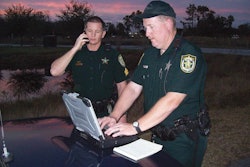Under the federal civil rights statute (Title 42, section 1983, of the United States Code), state and local government officials can be sued for money damages on grounds of the violation of the plaintiff's constitutional rights under color of authority. (Federal officers can be sued under Bivens v. Six Unknown Named Agents.) For example, if an officer makes an unreasonable arrest, the arrested person may be able to sue for a violation of his or her Fourth Amendment rights, because that amendment explicitly guarantees everyone a right to be free from unreasonable seizures.
Due Process and Civil Liability
Of course, there is no constitutional right to be protected by police against exposure to danger. So how could a person frame a federal lawsuit against an officer by simply claiming the officer failed to protect him from whatever injury he suffered? The Supreme Court and the U.S. Court of Appeals have said that the Fifth and Fourteenth Amendment due process clauses can provide grounds for a civil rights lawsuit under either of two separate doctrines: (1) the "special relationship" doctrine; or (2) the "state-created danger" doctrine.
"Special Relationship" Liability
"A special relationship exists when the state assumes control over an individual sufficient to trigger an affirmative duty to provide protection to that individual (e.g., when the individual is a prisoner or involuntarily committed mental patient)." (Uhlrig v. Harder) In other words, when you assume custody of a person, you also assume the responsibility to take reasonable steps to provide for his or her care and safety and to ensure the person's protection against foreseeable risks.
This kind of claim is primarily made against corrections officials, but it may also be made against local police in their operation of a jail or even while a person is under arrest and in the custody of an officer. For example, if you arrest and handcuff a person and place him into the back seat of the police car for transportation to the station but you fail to secure him with a seat belt, any injuries he sustains if someone rear-ends your police car could make you and your employing agency liable for a due process violation. Since your prisoner was unable to put on his own seat belt, you had an affirmative duty to belt him in before driving away.
"State-Created Danger" Liability
More common than a claim of liability based on the "special relationship" doctrine is a claim that someone who was not in police custody nevertheless came to injury or death at the hands of another, or via human or natural hazards, because of something police did or failed to do in circumstances of obvious danger. This is the "state-created danger" theory of liability.
"Although the state's failure to protect an individual against private violence does not generally violate the guarantee of due process, it can where the state action affirmatively places the plaintiff in a position of danger, that is, where state action creates or exposes an individual to a danger which he or she would not otherwise have faced." (Kennedy v. Ridgefield)
In other words, if you become involved in an incident and your action or omission places the person in a more precarious position than if you had not intervened at all, you could face liability for creating a greater danger.
Examples of application of the "state-created danger" doctrine are more numerous than "special relationship" cases, and they are often far more tragic in their facts. Just a few will be enough to illustrate how this doctrine works.
Wood v. Ostrander.
Washington troopers stopped a car at 2:30 a.m., arrested the driver for DUI, and impounded the car, leaving the passenger/wife to walk away alone in a high-crime area. She was later picked up by a man who drove her to a secluded spot and raped her. The Court of Appeals ruled that these allegations created potential liability based on state-created danger, since the police actions placed the wife at greater risk of being assaulted than she had faced before police intervention.[PAGEBREAK]
Kniepp v. Tedder.
A man and his drunken wife were walking to their home in Philadelphia one winter night when police officers detained them. Because the pair were less than a block from home, the officers allowed the husband to go on home to care for their child, while they detained the wife a bit longer. Although the wife was visibly intoxicated and had difficulty walking without assistance, police eventually released her to stagger away in the darkness. She fell down an embankment and suffered severe brain damage.
Her ability to sue for violation of her constitutional right of due process was upheld on the theory that once police separated the woman from the assistance of her husband and saw how inebriated she was, their decision to release her to make her own way in the darkness increased the level of danger that she would fall and injure herself.
Munger v. Glasgow.
Officers were called to a bar to eject a drunken and belligerent Lance Munger, who was causing a disturbance. Although the temperature outside in the Montana night was only 11 degrees with a wind-chill of minus 25, and even though Munger wore only jeans and a T-shirt, officers prevented him from getting into his truck or reentering the bar. He walked away into the night and froze to death two blocks away. Upholding his parents' right to sue, the Court of Appeals said that police had "placed Munger in a more dangerous position than the one in which they found him," and so could be held liable under the "state-created danger" doctrine.
Kennedy v. Ridgefield.
When police investigated charges that a 13-year-old neighbor had molested the Kennedys' 9-year-old daughter, the Kennedys expressed great fear that the boy was unstable and dangerous. They asked police to let them know before officers interviewed the boy, so they could take precautions.
Officers promised to do so, but instead contacted the boy and his mother without notifying the Kennedys. When the Kennedys learned of this, officers sought to allay their fears by assuring them of extra patrols around their house. That night, the boy broke into their house, shot Mr. Kennedy dead, and shot and wounded Mrs. Kennedy.
The Court of Appeals concluded that by giving assurances that were not kept and by discouraging the Kennedys from taking prudent precautions for their own protection, police had placed the victims in greater danger than they otherwise would have faced.
Take Care
As to individuals in your custody, you have a "special relationship" that requires you to take reasonable care of them. Failure to do so could result in federal civil
liability.
In most states, police are statutorily immune from tort damages for failing to protect the citizenry. However, once you do become involved in a situation, your acts or omissions that place others in dangers they did not otherwise face can cause liability under the federal civil rights laws for "state-created danger." (State tort liability for negligence is governed by state laws, which vary from state to state. Check these with your local civil advisers.)
Devallis Rutledge is a former police officer and veteran prosecutor who currently serves as Special Counsel to the Los Angeles County District Attorney. He is the author of 12 books, including "Investigative Constitutional Law."











